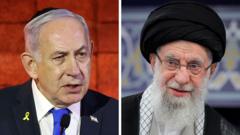As the humanitarian crisis in Gaza worsens, the EU's Chief Diplomat Kaja Kallas asserts that Israel's military strikes exceed necessary measures against Hamas. The EU opposes a new aid distribution model promoted by Israel and the US, stressing the need for proper humanitarian efforts to assist the beleaguered Palestinian population.
EU Criticizes Israeli Strikes in Gaza, Calls for Humanitarian Aid Reform

EU Criticizes Israeli Strikes in Gaza, Calls for Humanitarian Aid Reform
The European Union's top official condemns Israeli military actions in Gaza, advocating for a reconsideration of humanitarian assistance frameworks amid rising casualties.
The European Union (EU) has expressed serious concerns regarding the recent Israeli military actions in Gaza, with Kaja Kallas, the EU's chief diplomat, asserting that these strikes "go beyond what is necessary to fight Hamas." This statement comes amidst a rising death toll, now reported at 3,924 by the Hamas-run health ministry. Kallas also critiqued a new aid distribution plan backed by the US and Israel, which circumvents the UN and other humanitarian organizations. "We don't support the privatization of the distribution of humanitarian aid. Humanitarian aid cannot be weaponized," she emphasized.
The situation in Gaza has become increasingly dire, with a complete blockade imposed by Israel since March, further complicating the delivery of essential aid. Kallas highlighted that while the EU is a significant donor of humanitarian support, most aid remains inaccessible to those in dire need due to ongoing blockades. "The suffering of the people is untenable," she added.
The situation has drawn additional scrutiny from global leadership, with new German Chancellor Friedrich Merz expressing confusion over Israel's strategy in Gaza, stating the impact on civilians is no longer justifiable. The criticism from the UK, France, and Canada has intensified, prompting the UK to halt trade talks with Israel.
In response to the humanitarian crisis, the EU has initiated a formal review of its trade agreement with Israel, planning to propose potential measures at an upcoming meeting of foreign ministers in Brussels. Meanwhile, UN agencies are warning that Gaza's 2.1 million residents are facing severe hunger levels due to the prolonged blockade.
The proposed aid distribution system, spearheaded by the newly-formed Gaza Humanitarian Foundation (GHF), involves American security contractors. However, this method has been met with contention, as the UN deems it both unethical and ineffective. Israeli Prime Minister Benjamin Netanyahu has also reiterated aggressive plans aimed at relocating Gaza's population, a tactic viewed by many as forcible expulsion amidst ongoing military efforts against Hamas following the group’s cross-border attacks in October.
Israeli strikes in Gaza continue as the world watches the unfolding humanitarian crisis, with accusations of excessive force and ongoing negotiations for aid access sparking fierce debate on international humanitarian principles.






















